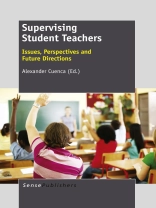The student teaching experience is often considered one of the most influential aspects of teacher preparation. Key in the success of student teaching is the university supervisor. During the student teaching experience, the university supervisor is mainly responsible for helping pre-service teachers relate university coursework with the situated experiences in schools. However, much like the various other spaces and places in teacher education, facilitating teacher learning is an incredibly complex endeavor. This edited volume addresses the complexities of supervising student teachers from three distinct vantage points. First, salient issues regarding the supervision of student teachers such as the preparation of novice supervisors, negotiating power in the student teaching triad, and the low status of clinical teacher education are examined. Second, different pedagogical frameworks for the work of supervision are provided such as care theory, teacher education for democracy, and social justice. Finally, future directions for field-based teacher education are discussed, such as a call to reconsider where supervision takes place, the necessity to develop a pedagogy of supervision, 21st century trends facing clinical teacher education, and the value added by university supervisors to teacher development. Each of these chapters engage the supervision of student teachers through a mix of research, theory, and personal stories from the field. As such, this edited volume is designed for new supervisors, veteran supervisors, and supervision scholars.
Tabla de materias
Introduction: The Complex and Undervalued Work of University Supervisors; 1. Becoming a University Supervisor: Troubles, Travails, and Opportunities; 2. The Problematology of Supervising Student Teachers; 3. Check it Before You Wreck it: Power in the Supervision Triad; 4. Observation Reports and the Mystery of Supervising Student Teachers: A Program Coordinator’s Perspective on Taking Teacher Education Seriously; 5. Care Theory: Cohesive Powers for Reflective Practice; 6. Supervision and the Lives of Student Teachers; 7. Toward More Democratic Student Teacher Supervision; 8. Gender Equity in the Classroom: Overcoming Attitudinal and Knowledge Barriers During Student Teaching; 9. Working Through the Uncertainties in Equity-Oriented Supervision; 10. Personal Examples of Self-Study as a Means of Developing and Enacting a Pedagogy of Supervision; 11. Rethinking the Spaces of Supervision: Psychoanalytic Considerations; 12. Supervision 1.3: Leveraging Trends in Teacher Preparation and Supervision to Address 21st Century Issues in the United States Context; 13. The Role of Supervision in Teacher Development.












